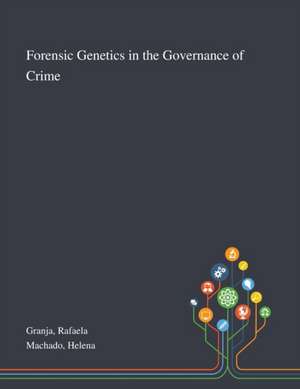Forensic Genetics in the Governance of Crime
Autor Rafaela Granja, Helena Machadoen Limba Engleză Paperback – 7 oct 2020
| Toate formatele și edițiile | Preț | Express |
|---|---|---|
| Paperback (1) | 248.51 lei 6-8 săpt. | |
| Saint Philip Street Press – 7 oct 2020 | 248.51 lei 6-8 săpt. | |
| Hardback (2) | 336.35 lei 6-8 săpt. | |
| Saint Philip Street Press – 7 oct 2020 | 336.35 lei 6-8 săpt. | |
| Springer Nature Singapore – 28 ian 2020 | 416.54 lei 6-8 săpt. |
Preț: 248.51 lei
Nou
Puncte Express: 373
Preț estimativ în valută:
47.55€ • 49.83$ • 39.31£
47.55€ • 49.83$ • 39.31£
Carte tipărită la comandă
Livrare economică 11-25 aprilie
Preluare comenzi: 021 569.72.76
Specificații
ISBN-13: 9781013270505
ISBN-10: 1013270509
Pagini: 120
Dimensiuni: 216 x 280 x 6 mm
Greutate: 0.3 kg
Editura: Saint Philip Street Press
ISBN-10: 1013270509
Pagini: 120
Dimensiuni: 216 x 280 x 6 mm
Greutate: 0.3 kg
Editura: Saint Philip Street Press
Cuprins
Chapter 1 Introduction.- Chapter 2 The Sociological Gaze.- Chapter 3 Biological Explanations of Criminal Behaviour.- Chapter 4 DNA Technologies in Criminal Investigation and Courts.- Chapter 5 DNA Databases and Big Data.- Chapter 6 Forensic Genetics and Governance of Transnational Criminality.- Chapter 7 Emerging DNA Technologies and Stigmatization.- Chapter 8 Conclusion.
Notă biografică
Helena Machado is Full Professor of Sociology at the University of Minho. She develops research of transdisciplinary nature, engaging the social studies of science, bioethics, and sociological and criminological perspectives to explore how genetics creates acute challenges to citizenship, democracy and social control in contemporary societies. In 2015, Machado was awarded a Consolidation Grant from the European Research Council.
Rafaela Granja, PhD, University of Minho, is a sociologist working in the project EXCHANGE, funded by European Research Council and led by Helena Machado. Her current research explores the transnational exchange of DNA data and controversies associated with scientific and technological innovations in the forensic field. Her previous work has focused on reconfigurations of family relationships inside and outside prisons.
Textul de pe ultima copertă
This open access book uses a critical sociological perspective to explore contemporary ways of reformulating the governance of crime through genetics. Through the lens of scientific knowledge and genetic technology, Machado and Granja offer a unique perspective on current trends in crime governance. They explore the place and role of genetics in criminal justice systems, and show how classical and contemporary social theory can help address challenges posed by social processes and interactions generated by the uses, meanings, and expectations attributed to genetics in the governance of crime. Cutting-edge methods and research techniques are also integrated to address crucial aspects of this social reality. Finally, the authors examine new challenges emerging from recent paradigm shifts within forensic genetics, moving away from the construction of evidence as presented in court to the production of intelligence guiding criminal investigations.
Caracteristici
Offers an in-depth analysis of the societal issues that frame the use of genetic technologies in the governance of crime in contemporary societies
Unique contribution to research, teaching and advanced training in sociology and criminology, which will also appeal to students of anthropology, law, science and technology studies (STS), police studies and international relations
Provides a comprehensive introduction for students to social theory and research methods related to the role and presence of science and genetic technologies in the governance of criminality
Unique contribution to research, teaching and advanced training in sociology and criminology, which will also appeal to students of anthropology, law, science and technology studies (STS), police studies and international relations
Provides a comprehensive introduction for students to social theory and research methods related to the role and presence of science and genetic technologies in the governance of criminality
